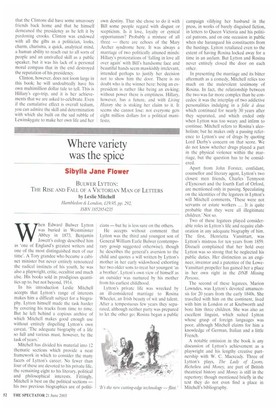Where variety was the spice
Sibylla Jane Flower
BULWER LYTTON: THE RISE AND FALL OF A VICTORIAN MAN OF LETTERS by Leslie Mitchell Hambledon & London, £19.95, pp. 292, ISBN 1852854235 When Edward Bulwer Lytton was buried in Westminster Abbey in 1873, Benjamin Jowett's eulogy described him as 'one ol England's greatest writers and one of the most distinguished men of our time'. A Tory grandee who became a cabinet minister but never entirely renounced the radical instincts of his youth, he was also a playwright, critic, occultist and much else. His books sold in prodigious quantities up to, but not beyond, 1914,
In his introduction Leslie Mitchell accepts that Lytton's range of interests makes him a difficult subject for a biography. Lytton himself made the task harder by covering his tracks from time to time. But he left behind a copious archive of which Mitchell makes good enough use without entirely dispelling Lytton's own caveat, 'The adequate biography of a life so full and various must, however, be the task of years.'
Mitchell has divided his material into 12 thematic sections which provide a neat framework in which to consider the many facets of Lytton's career. No fewer than four of these are devoted to his private life, the remaining eight to his literary, political and philosophical interests. Fittingly, Mitchell is best on the political sections — his two previous biographies are of politi
clans — but he is less sure on the others.
He accepts without comment that Lytton was the third and youngest son of General William Earle Bulwer (contemporary gossip suggested otherwise), though he describes the general's aversion to the child and quotes a will written by Lytton's mother in her early widowhood exhorting her two older sons to treat her youngest 'as a brother'. Lytton's own view of himself as an outsider was nurtured by his mother from his earliest childhood.
Lytton's private life was wrecked by an ill-considered marriage to Rosina Wheeler, an Irish beauty of wit and talent. After a tempestuous few years they separated, although neither party was prepared to let the other go; Rosina began a public campaign vilifying her husband in the press, in works of barely disguised fiction, in letters to Queen Victoria and his political patrons, and on one occasion in public when she harangued his constituents from the hustings. Lytton retaliated even to the extent of having Rosina locked away for a time in an asylum. But Lytton and Rosina never entirely closed the door on each other.
In presenting the marriage and its bitter aftermath as a comedy, Mitchell relies too much on the malevolent testimony of Rosina. In fact, the relationship between the two was far more complex than he concedes: it was the interplay of two addictive personalities indulging in a folie a deux which continued for nearly 30 years after they separated, and which ended only when Lytton was too weary and infirm to continue. Mitchell refers to Rosina's alcoholism; but he makes only a passing reference to Lytton's use of drugs by quoting Lord Derby's concern on that score. We do not know whether drugs played a part in the physical violence within the marriage, but the question has to be considered.
Apart from John Forster, confidant, counsellor and literary agent, Lytton's two closest men friends, Charles Tennyson d'Eyncourt and the fourth Earl of Orford, are mentioned only in passing. Speculating on the identities of the legatees in Lytton's will Mitchell comments, 'These were not servants or estate workers ... It is quite probable that they were all illegitimate children.' Not so.
Two of these legatees played considerable roles in Lytton's life and require elaboration in any adequate biography of him. The first, Henrietta Vansittart, was Lytton's mistress for ten years from 1859. Disraeli complained that her hold over Lytton was so strong that he neglected his public duties. Her distinction as an engineer, inventor and a patentee of the LoweVan sittart propeller has gained her a place in her own right in the DNB Missing Persons.
The second of these legatees, Marion Lowndes, was Lytton's devoted amanuensis for 20 years from the early 1840s. She travelled with him on the continent, lived with him in London or at Knebworth and bore him three children. She was also an excellent linguist, which suited Lytton whose grasp of foreign languages was poor, although Mitchell claims for him a knowledge of German, Italian and a little French.
A notable omission in the book is any discussion of Lytton's achievement as a playwright and his lengthy creative partnership with W. C. Macready. Three of Lytton's plays, The Lady of Lyons, Richelieu and Money, are part of British theatrical history and Money is still in the repertory; though mentioned briefly in the text they do not even find a place in Mitchell's bibliography.


































































































 Previous page
Previous page